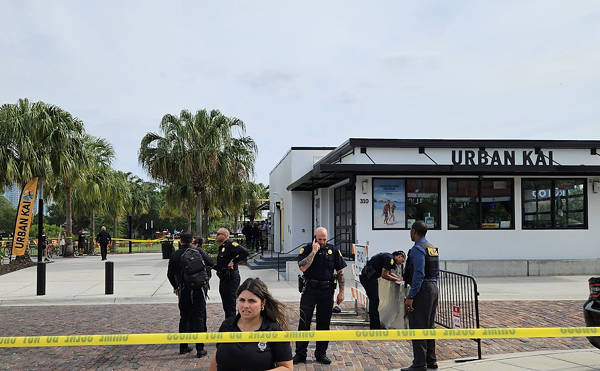When critics (like Peter Golenbock in this week's lead story) blast "The NCAA" for seemingly arbitrary punishments of rules violations in college sports, they're talking about people like Chris Griffin.
The Tampa attorney recently was appointed to the NCAA Division 1 Committee on Infractions, where he will participate in bi-monthly hearings involving member schools and individuals who are alleged to have violated NCAA regulations. Prior to that, he served for nearly a decade with the NCAA's Appeals Committee, which would only convene if a player or school appealed a penalty.
He believes the organization gets a bad rap in part because of its own poor PR.
"The NCAA is not a bunch of people making up rules that it's imposing on somebody else. The NCAA is an association of college and universities that create the rules and then apply those rules to themselves," says Griffin, chatting in the conference room of his firm, Foley & Lardner, with a view of the Hillsborough River and downtown Tampa.
To shore up his point, he adds that the NCAA board of directors isn't made up of anonymous bureaucrats or burned-out coaches; it's a group of college presidents, chaired for the past year by USF President Judy Genshaft.
There have always been scandals in amateur athletics, but nefarious behavior involving athletes has reached a new high (or low) over the past year. USC, Auburn, Ohio State and most recently Miami have all been busted, leading some observers to say the whole system is polluted.
The scandals have also led to more calls for player compensation, particularly in light of the prodigious amounts of money that schools, conferences and the NCAA are making, predominantly in college football and college basketball, from the students' skills. NCAA President Mark Emmert said recently he is looking at increasing grant-in-aid money to students to cover the full cost of attendance — clothing, miscellaneous costs, transportation — but he emphasizes that nobody wants to start paying athletes, since that would ruin the concept of amateurism.
Griffin doesn't really have a personal opinion on the subject of athlete compensation, but says the debate is a healthy one. He also says the devil would be in the details. "How does it pay? How is it calculated?" He says that it's not beyond NCAA officials to discuss such scenarios off the record, but says the issue never enters into discussions by NCAA rule-enforcing committees like the ones on which he serves.
"There's a rule, you knew what the rule was, and there's an allegation that you violated it. We're going to decide what the penalty is," he says succinctly.
Another recent story that has fueled criticism of the NCAA occurred late last year, when Ohio State quarterback Terrell Pryor and four of his teammates were found to have been trading autographs for tattoos. The five were suspended for the first five games of the 2011 season, but were somehow allowed to play in the Sugar Bowl at the end of the season.
But this fuels Griffin's opinion that the sports media is letting down the public; the eligibility/reinstatement process, he says, is completely separate from enforcement.
He generally tries to stay away from media coverage of rules violations, though he admits "Miami is impossible to avoid," referring to the sex-and-money student-athlete scandal uncovered by Yahoo Sports and referenced in Golenbock's article.
Griffin is a Tampa native who played football at Hillsborough High before earning a scholarship with Florida State in the early 1970s, where he starred as a cornerback. But even though he dug the experience, it wasn't all champagne and caviar.
As a sophomore, Griffin was part of a defensive squad that went through a notoriously brutal training regimen. Twenty-eight players quit the team, resulting in an 0-11 season in 1974. (The defensive coach in charge at the time? Bill Parcells.) He says that was a defining experience, which at the time affected all the players' self-esteem and self-confidence.
And because he knows how much pure joy and sense of community college sports can bring to people both inside and outside a university, he's determined to try to make sure it's done correctly.
"Keep in mind, they're not athletes, they're student athletes," he asserts, though with the EPSN highlights and proliferating sports blogs it's easier than ever to forget that. "The number one objective is a student-athlete experience, not an athletic experience — and there's a big difference."
















